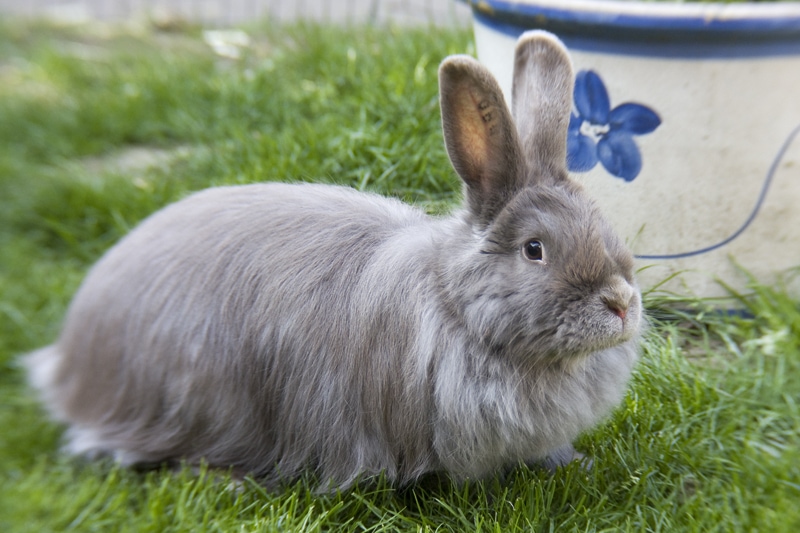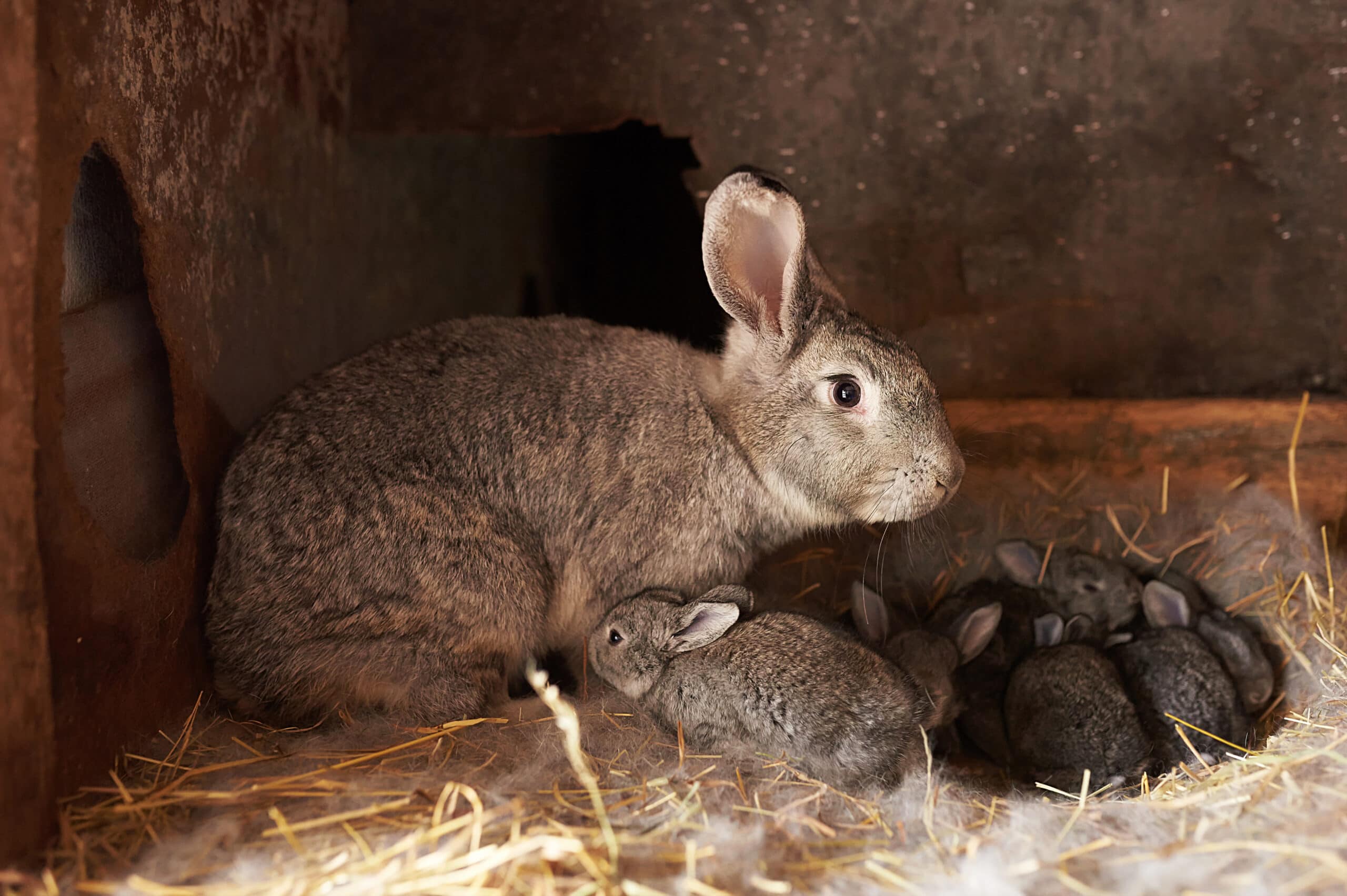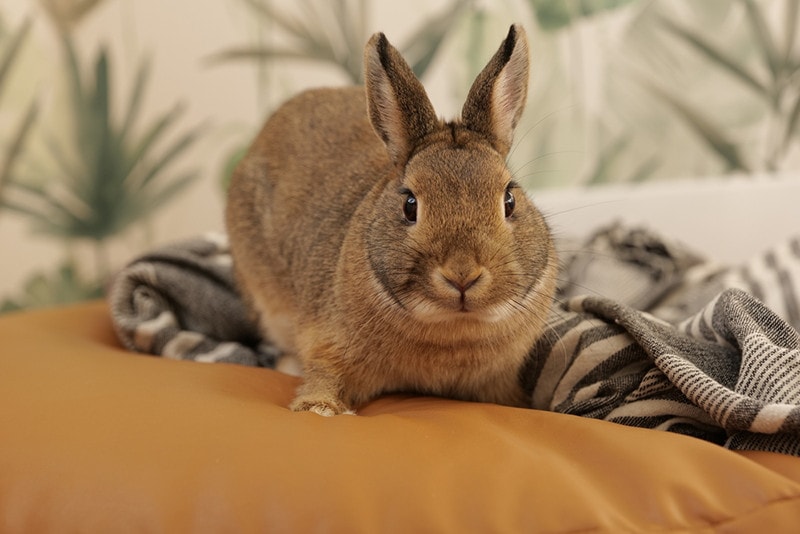Swiss Fox Rabbit: Info, Pictures, Care Guide, Lifespan & Traits

Updated on

Click to Skip Ahead
The Swiss Fox Rabbit is a rare breed. As the name suggests, they originate from Switzerland. Arctic fox fur was coveted during the 1920s, and to create a rabbit with this type of fur, the Havana rabbit was crossed with the Angora.
The resulting rabbit differed from the breeders’ expectations, so their initial popularity could have been higher. Thankfully, enthusiasts put the time in to create the soft-haired, docile rabbit we now know as the Swiss Fox Rabbit.
The Swiss Fox Rabbit is more widely known throughout Europe, and finding one might be challenging. However, they’re worth the search, and we’ll discuss this beautiful bunny and the characteristics that make them unique!
| Size: | Medium |
| Weight: | 5.5–7.5 pounds |
| Lifespan: | 5–7 years |
| Similar Breeds: | Jersey Wolly Rabbit, English Spot Rabbit, Alaska Rabbit |
| Suitable for: | Families with older children, single people, first-time owners, senior owners |
| Temperament: | Loves attention, gentle, patient |
The Swiss Fox Rabbit is a mix of the Havana and Angora rabbits, and if you’re familiar with mixed breeds, you’ll already know that resulting mixed-bred rabbits can produce an unknown blend from both parents. So, let’s look at the parents to see the possibilities.
Havanas are considered one of the calmest breeds, loved for their antics and affectionate personalities. They’re not aggressive and love to run about and play. Angoras are also gentle, intelligent rabbits that love to play but can become aggressive when picked up since it frightens them.
Swiss Fox Rabbit Breed Characteristics
How Much Do These Rabbits Cost?
You can generally get a rabbit cheaper from a pet store, but we suggest opting for a reputable breeder; pet stores aren’t as careful about where they get their rabbits from, and the care they receive is not the same. Rabbits from experienced breeders also tend to be more docile and tame.
Generally, rabbits can cost $20–$50; however, since the Swiss Fox is so rare in the United States, the price will likely be around $65 or more. Prices will vary depending on the sex, pedigree, and coat quality of your Swiss Fox and where you live.
Temperament & Intelligence of the Swiss Fox Rabbit
The Swiss Fox Rabbit is friendly and docile, which is arguably one of the main reasons they did not go extinct when the breeding experiment went wrong in the first place. They enjoy being brushed and tolerate being handled. Because they aren’t skittish, they also make excellent show rabbits.
The Swiss Fox is intelligent and can be trained to use a litter box, much like a cat. If you have the time and the patience, you can teach them other tricks. They are happy to spend time in your lap if you are gentle with them.
Do These Rabbits Make Good Pets? 👪
Swiss Fox Rabbits are excellent pets, but you must teach your children how to handle them if you have young children. Rabbits are delicate and can be easily injured if handled improperly. They are calm but can easily injure themselves if agitated—if they want to get away, they will jump off your lap to get away as fast as possible.
Does This Rabbit Get Along With Other Pets?
Swiss Fox Rabbits tend to get along with other rabbits, especially those of the same breed, and benefit from having a friend if you are out of the house sometimes for long periods for work, for example. If introducing a new rabbit to an existing Swiss Fox, do so slowly. You might even have to keep them in different living spaces initially; females are more territorial than males, so keep this in mind.
Regarding other species, it’s important to note that rabbits are prey animals, and if you have a cat or a dog, you might need to keep them separate. Animals with strong prey drives might harm the rabbit. Even if you have socialized your cat or dog early, remember that your pets are still animals and can behave unpredictably.
Things to Know When Owning a Swiss Fox Rabbit:
Food & Diet Requirements 🥕
Like other breeds, the Swiss Fox Rabbit thrives on fiber-rich foods, and they enjoy roughage. They should have access to a constant supply of hay, which helps with digestion and controlling tooth growth. They should also be fed leafy vegetables, and you can give them a small portion of pellets.
If this is your first time owning a rabbit, you can always get guidance from your veterinarian if you are still trying to figure out where to start when finding a suitable, well-balanced diet.
Habitat & Hutch Requirements 🏠
An indoor hutch is the best option for the Swiss Fox; however, if they have to live outdoors, they will adapt with your help—expect to put more time into socialization and coat maintenance. You will also need to ensure they are protected from predators.
They need a spacious cage, at least 30” by 30” by 24”, so they can sit up, stretch, and hop about. They also require plenty of time (2 to 3 hours) outside the cage for much-needed exercise and playtime.
Inside the cage, they need proper bedding to have a comfortable resting place. You can use paper-based bedding or straw to line the cage. Be sure to clean the hutch frequently so your rabbit isn’t uncomfortable. The cage will need to be cleaned and the bedding replaced at least once a week, which will increase if you have more than one rabbit.
Exercise & Sleeping Needs 🐇
Exercise is essential for your rabbit’s mental and physical health. It would be best to provide a rabbit run outside their cage where they can forage for food, which will keep them mentally stimulated.
A lack of exercise can also cause your rabbit stress, leading to them developing other serious health problems. Swiss Fox Rabbits also enjoy spending time with their owners, so exercise is an excellent opportunity to bond with one another.
A clean, safe place to rest is vital for your Swiss Fox; rabbits need around 12–14 hours of sleep daily. They are generally quietest during the day between noon and four and will be most active in the early morning, night, and dusk.
Training 🥎
When people think of training their pets, they think about dogs or cats, but not usually rabbits. However, the Swiss Fox is an incredibly intelligent rabbit, and you can teach it many things if you have the time and patience.
Swiss Fox Rabbits can be trained to wear a harness comfortably and walk on a leash. Choose a harness designed specifically for rabbits, and you can train them using treats until they get used to this new experience. Never raise your voice or drag your rabbit on the leash; this will only frighten them and cause them stress.
Your Swiss Fox Rabbit can also be potty trained. Being able to do this gives your rabbit the option to roam around the house and get a little more exercise. Rabbits defecate as they eat, so putting their hay in their clean litter box is a great way to convince them to use it.
Grooming ✂️
It might surprise you to know, once you’ve seen their longer coat, that the Swiss Fox Rabbit is considered a low-maintenance pet in terms of grooming. You must brush their fur at least once weekly to keep it free from matting and tangling. This is another excellent way to bond with your rabbit and can be enjoyable for you both.
Rabbits molt once a year, which means if they have a dense coat like the Swiss Fox, expect them to shed a lot. Grooming, in general, is essential for this breed because they tend to struggle with digestive issues because they are guilty of over-grooming their long coats.
Lifespan and Health Conditions 🏥
Swiss Fox Rabbits can become sick if they ingest too many of their long hairs, and most severely, it can even cause death. If you notice hair in their poo or if they are constipated, take them to see the vet as soon as possible. Grooming the Swiss Fox is vital, as is feeding them roughage, which will help this hair move through their digestive system instead of clogging it up.
Conditions to be on the lookout for are those that affect many rabbit breeds:
- Dental issues (such as overgrown teeth)
- Ear mites and infections
- Skin mites and infections
- Respiratory issues
- Ileus
Male vs Female
There aren’t many notable differences between the genders except that males can be slightly larger, but it is so slight that it will not affect their care or your decision to opt for one over the other. Generally, males tend to show less aggressive tendencies and are less territorial. However, the Swiss Fox is a calm breed, and both sexes should be easy enough to handle, even for a new rabbit parent.
3 Little-Known Facts About Swiss Fox Rabbits
1. They Survived Because of Switzerland’s Neutral Stance in the War
Swiss Fox rabbits became popular in Germany, leading to them losing popularity in other countries during World War II because of their connection to Germany. Thankfully, they were still prevalent in Switzerland, so they made a strong comeback in Europe at the end of the war.
2. Their Fur Has Two, Dense Layers
This rabbit’s coat has a lighter gray underlayer and an overcoat that is generally different shades of gray but is typically lilac or dove-gray. Other accepted coat colors are black, Havana, chinchilla, and white with blue or red eyes.
3. They Have No Facial Markings
Unlike the Angora, the Swiss Fox doesn’t have any facial markings. They are also the perfect choice for an owner wanting a long-haired rabbit like the Angora without all the work that goes into grooming one.
Final Thoughts
Swiss Fox Rabbits are well-suited to all families but would do better with older children if you have kids. They are an excellent choice for first-time owners because of their gentle, docile nature. They are rare in the States and more expensive than some breeds, but it’s clear they’re worth it, and we have a feeling they won’t be rare for much longer!
Featured Image Credit: Voskonijn-Feh (Image Credit: Aramat, Wikimedia Commons CC 2.0 Generic)











